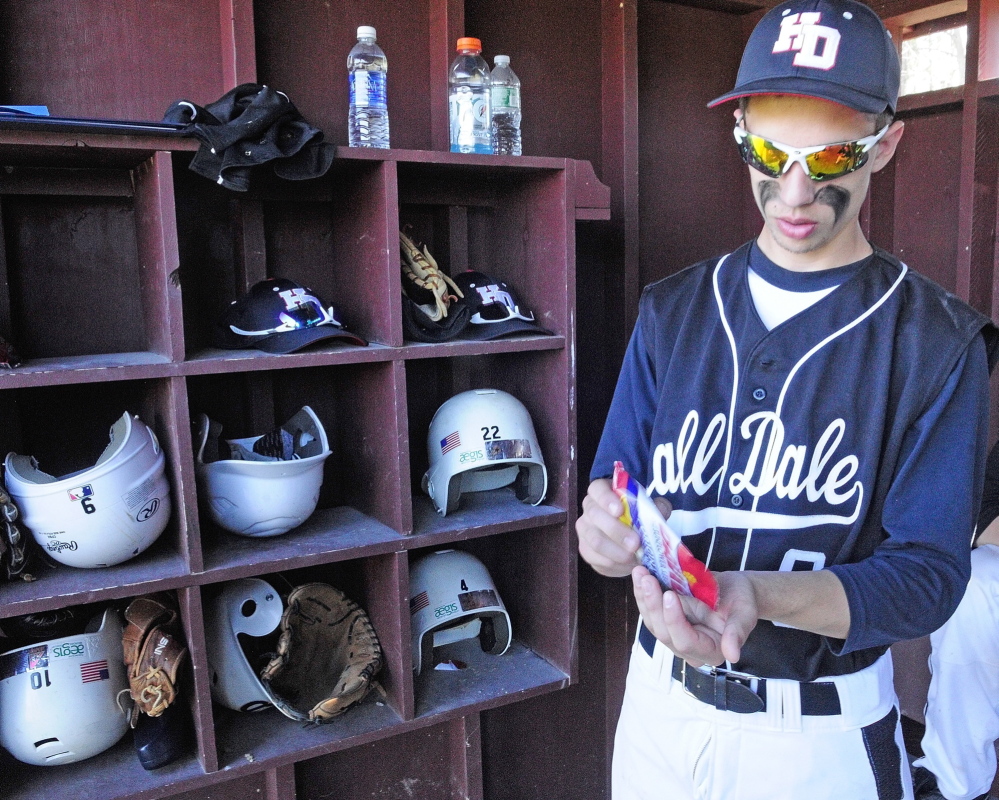Baseball is a game of intermittent action.
Although six or seven players may swing into motion when there’s a ground ball to second with men on base, there are another dozen or so sitting in the dugout waiting for their turn. That’s why there’s so much chewin’, spittin’, and scratchin’ going on.
“I think in baseball we all like to have something going on,” Cony coach Don Plourde said.
Pranks aside — who doesn’t appreciate a good hot foot or a shaving cream pie to the face — the game invites activity to alleviate the boredom. For most players, from Little League to the bigs, that means chewing sunflower seeds.
“I go through a bag a game between BP, infield and the game itself,” Gardiner coach Chris McLaughlin said.
No one’s quite sure where the habit started, but Reggie Jackson was one of the first high profile players to use them in the major leagues, back in the late 1960s. The majors, of course, still allows players to chew tobacco (see Jake Peavy and David Ortiz) although it was banned in the minor leagues a few years ago.
Back in the day, even high school players used smokeless tobacco, but tobacco is banned from school campuses and illegal for those under 18 to use it.
Seeds are a much healthier alternative and dominate the chewing landscape throughout the game.
“I’ve been using them since farm league,” Hall-Dale sophomore Ryan Sinclair said. “I keep them in my back pocket.”
Regular, generic sunflower seeds, the kind favored by squirrels and Bobolinks, are a rarity in dugouts these days. It’s all about flavors and there are several popular ones, including Ranch, Teriyaki, Barbecue and Buffalo.
“I like Sizzlin’ Bacon,” Monmouth pitcher Nate Gagne said. “They’re pretty good.”
While some players suck the flavor off the seeds and spit them out machine-gun style, most have developed the ability to store them in their cheek like chipmunks, and deftly break the shells and eat the prize inside before ejecting them.
“I put in a bunch,” Sinclair said. “I crack them one after another the long way.”
Sinclair, a shortstop and pitcher, chews them in the field as well as the dugout. McLaughlin keeps tabs of his chewing habits, too.
“I can tell if I’m the only one chewing them,” he said. “I’ll have a pile of them at third base (in the coaching box).”
Dugouts routinely yield piles of seeds during post-game cleanup, but they’re barely noticed in the field, with the exception of artificial turf.
“There are very few sports where you have the time (or opportunity) to eat a couple of seeds,” McLaughlin said. “You can’t do it in the gym, the ice arena, on the football field.”
Plourde has used sunflower seeds most of his life but is off them for the time being after dislodging a temporary tooth while chewing them a month ago. Presumably he’ll go back when he gets a permanent implant.
“My dentist said ix-nay on the seeds,” he said.
Sunflower seeds are relatively inexpensive. A regular bag goes for less than a buck and a half and larger bags are much cheaper. McLaughlin said he used to buy big bags at Sam’s Club for the dugout, but these days most of his players — he estimates 75 percent of them — prefer their own bags and flavors.
“I’m strictly Ranch,” he said.
When the game is over most baseball players put the seeds away until the next time they take the field.
“It’s just part of the whole baseball atmosphere,” Gagne said.
Gary Hawkins — 621-5638 | ghawkins@centralmaine.com | Twitter: @GaryHawkinsKJ
Copy the Story LinkSend questions/comments to the editors.



Success. Please wait for the page to reload. If the page does not reload within 5 seconds, please refresh the page.
Enter your email and password to access comments.
Hi, to comment on stories you must . This profile is in addition to your subscription and website login.
Already have a commenting profile? .
Invalid username/password.
Please check your email to confirm and complete your registration.
Only subscribers are eligible to post comments. Please subscribe or login first for digital access. Here’s why.
Use the form below to reset your password. When you've submitted your account email, we will send an email with a reset code.